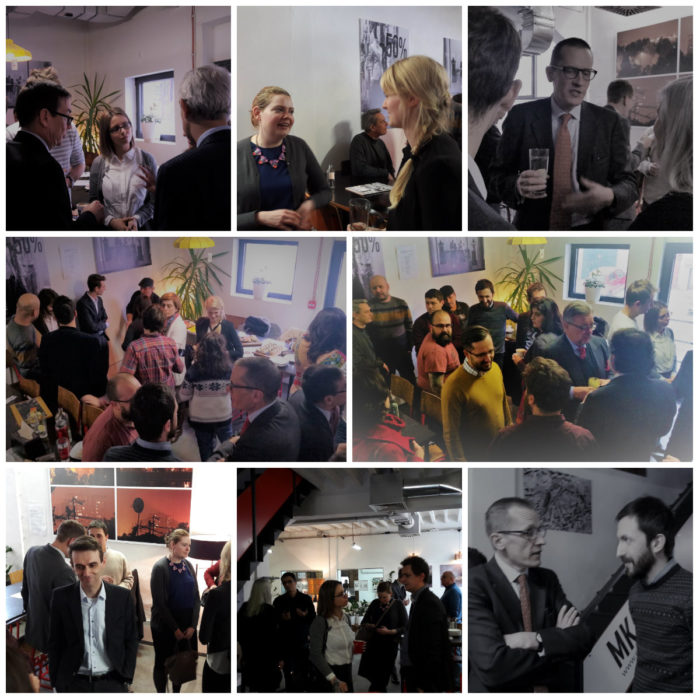6th February 2017 Skopje, North Macedonia
Five Thoughts on Diplomatic Tweeting in Macedonia

Like all British Ambassadors, I was encouraged (slight diplomatic euphemism) by the Foreign & Commonwealth Office to get active on Twitter when I came to Skopje. TBH, as twitterati say, I had anyway been thinking of jumping in to the frenzied waters of social media. So I readily bought the FCO’s argument that it was now an essential channel of communication, especially for Embassies, and that the risks were manageable.
I set up an account and arrived in Skopje in May 2014 with 43 followers. Almost three years on, was the FCO right? Here are five thoughts.
- Twitter and Facebook are an essential part of diplomats’ communication, in Macedonia just as much as anywhere.
Things used to be simple. When I first joined the FCO, pretty much everyone got all their news via print and broadcast media. And they did this once or twice a day at a set time. Today they get their news from hundreds of sources online. And they do it constantly, throughout the day and night, often in a drip-feed courtesy of social media. For diplomats, this is a bigger challenge than before. Information flows are now much more complex. And, if we want to engage, we need to understand them. Who is listening to whom, and how?
Bonus in the package is that it greatly expands our access to relevant information about Macedonia. Follow the right accounts, and you get a more varied and much wider selection of articles than in the days when annual subscriptions to newspapers and magazines largely defined what you read.
- If you go for it, you can achieve much more effective engagement than in the old days.
Social media sometimes looks like a scatter-gun approach. But, by knowing your audience and use of devices like hashtags, you can make it highly targeted. Key here is quality of followers, not quantity. You can also make it two-way, engaging with individuals or groups in a way that simply wasn’t possible before. I’ve spent hours in bracing debate with followers about key issues for Macedonia like judicial independence or balance and impartiality in the media. And the two-way bit means you get direct feedback: with that, and the powerful analytics tools now available, we know far more than we used to about how our messages land.
- Getting active, especially on Twitter, gives me a great source of advice on use of Macedonian.
Collectively my followers, perhaps alarmed at the way I can mangle their beautiful language, are one hell of a language tutor. Благодарение на еден следбеник, дознав дека мора да кажам што чекам нешто со нетрпение, а не со нетрпење.
- But it’s not all upside gain.
There’s a definite downside in the trolling. Different opinions are one thing. They’re a key part of any constructive public debate. But you need a thick skin for some of the abuse that gets thrown about. Inevitably perhaps, social media also increases the pressure to focus on the job 24/7. That ping as a message comes in: answering it in the morning may not have quite the same impact as a quick response now. And you can’t eliminate the risks. Like most Twitter or Facebook users, I’ve dropped the occasional clanger. I’ve learnt to tread carefully; but, at least for me, managing the risks of social media is part of what makes it fun.
After the elections in Macedonia in December, members of the International Community were often trolled with complaints that they were supporting the opposition. When the opposition scheduled a briefing for diplomats on post-election events, we knew that my attendance could trigger more trolling on the grounds that I was favouring the opposition.
So, rather than having to react after the event to accusations of bias, we got on the front foot by making clear in advance that we were open to briefings from all sides. I tweeted my intention to attend the opposition briefing, adding that I would gladly attend one by the governing parties as well.
It didn’t stop trolling completely, but it decreased the scope for accusations of bias, however unfounded, and achieved excellent outreach. A couple of days later, the foreign minister announced his own briefing for diplomats.
- For added impact, combine Online with Offline.
Following people online and monitoring the debate on social media is not enough to establish your credibility in the digital world. There has to be offline engagement with the people who follow us and whom we follow. We started holding tweet-ups two and a half years ago. And we’ve found them an excellent channel for building credibility (for example confirming that it is actually me writing tweets), and for developing more personal relationships than are possible on social media. It is perhaps no surprise that those we engage with most on social media are also interesting and useful contacts in real life. Our latest gathering, in January, was no exception.

1 comment on “Five Thoughts on Diplomatic Tweeting in Macedonia”
Comments are closed.